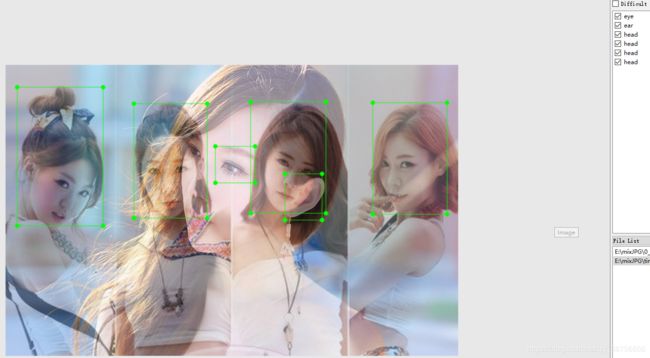目标检测中的数据增强方法之——mixup:针对小样本
在深度学习中,一般要求样本的数量要充足,样本数量越多,训练出来的模型效果越好,模型的泛化能力越强。但是实际中,样本数量不足或者样本质量不够好,这就要对样本做数据增强,来提高样本质量。
在样本量不足的情况下,采用mixup或者填鸭式的方法来进行数据增强,是行之有效的增强方法。其中mixup是将正负样本融合成新的一组样本,使得样本量翻倍。填鸭式是将原本样本里的目标抠出来,随机复制粘贴到其他地方。(个人理解)
以下是mixup方法的代码示例:
# coding:utf-8
import cv2
import os
import random
import numpy as np
import xml.etree.ElementTree as ET
import xml.dom.minidom
img_path = 'E:/jpg/' # 原始图片文件夹路径
save_path = 'E:/mixJPG/' # mixup的图片文件夹路径
xml_path = 'E:/xml/' # 原始图片对应的标注文件xml文件夹的路径
save_xml = 'E:/mixXML/' # mixup的图片对应的标注文件xml的文件夹路径
img_names = os.listdir(img_path)
img_num = len(img_names)
print('img_num:', img_num)
for imgname in img_names:
imgpath = img_path + imgname
img = cv2.imread(imgpath)
img_h, img_w = img.shape[0], img.shape[1]
print(img_h,img_w)
i = random.randint(0, img_num - 1)
print('i:', i)
add_path = img_path + img_names[i]
addimg = cv2.imread(add_path)
add_h, add_w = addimg.shape[0], addimg.shape[1]
if add_h != img_h or add_w != img_w:
print('resize!')
addimg = cv2.resize(addimg, (img_w, img_h), interpolation=cv2.INTER_LINEAR)
scale_h, scale_w = img_h / add_h, img_w / add_w
lam = np.random.beta(1.5, 1.5)
print(lam)
mixed_img = lam * img + (1 - lam) * addimg
save_img = save_path + imgname[:-4] + '_3.jpg'
cv2.imwrite(save_img, mixed_img)
print(save_img)
print(imgname, img_names[i])
if imgname != img_names[i]:
xmlfile1 = xml_path + imgname[:-4] + '.xml'
xmlfile2 = xml_path + img_names[i][:-4] + '.xml'
print(xmlfile1,xmlfile2)
tree1 = ET.parse(xmlfile1)
tree2 = ET.parse(xmlfile2)
doc = xml.dom.minidom.Document()
root = doc.createElement("annotation")
doc.appendChild(root)
for folds in tree1.findall("folder"):
folder = doc.createElement("folder")
folder.appendChild(doc.createTextNode(str(folds.text)))
root.appendChild(folder)
for filenames in tree1.findall("filename"):
filename = doc.createElement("filename")
filename.appendChild(doc.createTextNode(str(filenames.text)))
root.appendChild(filename)
for paths in tree1.findall("path"):
path = doc.createElement("path")
path.appendChild(doc.createTextNode(str(paths.text)))
root.appendChild(path)
for sources in tree1.findall("source"):
source = doc.createElement("source")
database = doc.createElement("database")
database.appendChild(doc.createTextNode(str("Unknow")))
source.appendChild(database)
root.appendChild(source)
for sizes in tree1.findall("size"):
size = doc.createElement("size")
width = doc.createElement("width")
height = doc.createElement("height")
depth = doc.createElement("depth")
width.appendChild(doc.createTextNode(str(img_w)))
height.appendChild(doc.createTextNode(str(img_h)))
depth.appendChild(doc.createTextNode(str(3)))
size.appendChild(width)
size.appendChild(height)
size.appendChild(depth)
root.appendChild(size)
nodeframe = doc.createElement("frame")
nodeframe.appendChild(doc.createTextNode(imgname[:-4] + '_3'))
objects = []
for obj in tree1.findall("object"):
obj_struct = {}
obj_struct["name"] = obj.find("name").text
obj_struct["pose"] = obj.find("pose").text
obj_struct["truncated"] = obj.find("truncated").text
obj_struct["Difficult"] = obj.find("Difficult").text
bbox = obj.find("bndbox")
obj_struct["bbox"] = [int(bbox.find("xmin").text),
int(bbox.find("ymin").text),
int(bbox.find("xmax").text),
int(bbox.find("ymax").text)]
objects.append(obj_struct)
for obj in tree2.findall("object"):
obj_struct = {}
obj_struct["name"] = obj.find("name").text
obj_struct["pose"] = obj.find("pose").text
obj_struct["truncated"] = obj.find("truncated").text
obj_struct["Difficult"] = obj.find("Difficult").text # 有的版本的labelImg改参数为小写difficult
bbox = obj.find("bndbox")
obj_struct["bbox"] = [int(int(bbox.find("xmin").text) * scale_w),
int(int(bbox.find("ymin").text) * scale_h),
int(int(bbox.find("xmax").text) * scale_w),
int(int(bbox.find("ymax").text) * scale_h)]
objects.append(obj_struct)
for obj in objects:
nodeobject = doc.createElement("object")
nodename = doc.createElement("name")
nodepose = doc.createElement("pose")
nodetruncated = doc.createElement("truncated")
nodeDifficult = doc.createElement("Difficult")
nodebndbox = doc.createElement("bndbox")
nodexmin = doc.createElement("xmin")
nodeymin = doc.createElement("ymin")
nodexmax = doc.createElement("xmax")
nodeymax = doc.createElement("ymax")
nodename.appendChild(doc.createTextNode(obj["name"]))
nodepose.appendChild(doc.createTextNode(obj["pose"]))
nodepose.appendChild(doc.createTextNode(obj["truncated"]))
nodeDifficult.appendChild(doc.createTextNode(obj["Difficult"]))
nodexmin.appendChild(doc.createTextNode(str(obj["bbox"][0])))
nodeymin.appendChild(doc.createTextNode(str(obj["bbox"][1])))
nodexmax.appendChild(doc.createTextNode(str(obj["bbox"][2])))
nodeymax.appendChild(doc.createTextNode(str(obj["bbox"][3])))
nodebndbox.appendChild(nodexmin)
nodebndbox.appendChild(nodeymin)
nodebndbox.appendChild(nodexmax)
nodebndbox.appendChild(nodeymax)
nodeobject.appendChild(nodename)
nodeobject.appendChild(nodepose)
nodeobject.appendChild(nodetruncated)
nodeobject.appendChild(nodeDifficult)
nodeobject.appendChild(nodebndbox)
root.appendChild(nodeobject)
fp = open(save_xml + imgname[:-4] + "_3.xml", "w")
doc.writexml(fp, indent='\t', addindent='\t', newl='\n', encoding="utf-8")
fp.close()
else:
xmlfile1 = xml_path + imgname[:-4] + '.xml'
print(xmlfile1)
tree1 = ET.parse(xmlfile1)
doc = xml.dom.minidom.Document()
root = doc.createElement("annotation")
doc.appendChild(root)
for folds in tree1.findall("folder"):
folder=doc.createElement("folder")
folder.appendChild(doc.createTextNode(str(folds.text)))
root.appendChild(folder)
for filenames in tree1.findall("filename"):
filename=doc.createElement("filename")
filename.appendChild(doc.createTextNode(str(filenames.text)))
root.appendChild(filename)
for paths in tree1.findall("path"):
path = doc.createElement("path")
path.appendChild(doc.createTextNode(str(paths.text)))
root.appendChild(path)
for sources in tree1.findall("source"):
source = doc.createElement("source")
database = doc.createElement("database")
database.appendChild(doc.createTextNode(str("Unknow")))
source.appendChild(database)
root.appendChild(source)
for sizes in tree1.findall("size"):
size = doc.createElement("size")
width = doc.createElement("width")
height = doc.createElement("height")
depth = doc.createElement("depth")
width.appendChild(doc.createTextNode(str(img_w)))
height.appendChild(doc.createTextNode(str(img_h)))
depth.appendChild(doc.createTextNode(str(3)))
size.appendChild(width)
size.appendChild(height)
size.appendChild(depth)
root.appendChild(size)
nodeframe = doc.createElement("frame")
nodeframe.appendChild(doc.createTextNode(imgname[:-4] + '_3'))
objects = []
for obj in tree1.findall("object"):
obj_struct = {}
obj_struct["name"] = obj.find("name").text
obj_struct["pose"] = obj.find("pose").text
obj_struct["truncated"] = obj.find("truncated").text
obj_struct["Difficult"] = obj.find("Difficult").text
bbox = obj.find("bndbox")
obj_struct["bbox"] = [int(bbox.find("xmin").text),
int(bbox.find("ymin").text),
int(bbox.find("xmax").text),
int(bbox.find("ymax").text)]
objects.append(obj_struct)
for obj in objects:
nodeobject = doc.createElement("object")
nodename = doc.createElement("name")
nodepose = doc.createElement("pose")
nodetruncated = doc.createElement("truncated")
nodeDifficult = doc.createElement("Difficult")
nodebndbox = doc.createElement("bndbox")
nodexmin = doc.createElement("xmin")
nodeymin = doc.createElement("ymin")
nodexmax = doc.createElement("xmax")
nodeymax = doc.createElement("ymax")
nodename.appendChild(doc.createTextNode(obj["name"]))
nodepose.appendChild(doc.createTextNode(obj["pose"]))
nodetruncated.appendChild(doc.createTextNode(obj["truncated"]))
nodeDifficult.appendChild(doc.createTextNode(obj["Difficult"]))
nodexmin.appendChild(doc.createTextNode(str(obj["bbox"][0])))
nodeymin.appendChild(doc.createTextNode(str(obj["bbox"][1])))
nodexmax.appendChild(doc.createTextNode(str(obj["bbox"][2])))
nodeymax.appendChild(doc.createTextNode(str(obj["bbox"][3])))
nodebndbox.appendChild(nodexmin)
nodebndbox.appendChild(nodeymin)
nodebndbox.appendChild(nodexmax)
nodebndbox.appendChild(nodeymax)
nodeobject.appendChild(nodename)
nodeobject.appendChild(nodepose)
nodeobject.appendChild(nodetruncated)
nodeobject.appendChild(nodeDifficult)
nodeobject.appendChild(nodebndbox)
root.appendChild(nodeobject)
fp = open(save_xml + imgname[:-4] + "_3.xml", "w")
doc.writexml(fp, indent='\t', addindent='\t', newl='\n', encoding="utf-8")
fp.close()
以上代码是针对目标检测原始图片和采用标注工具labelImg标注得到的xml文件进行mixup的数据增强。
原始数据的标注样例和mixup之后的数据示例如下:


以上是两张原始图片的labelImg标注样例。
下面是mixup数据增强后的图片示例:


由上述示例图片可以看出mixup是将原始数据中的随机两个数据进行正负样本融合成新的一组样本,由此使得样本量翻倍,同时mixup后的每个数据中目标物都会比原始数据中的目标物多。